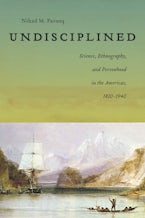Undisciplined
Science, Ethnography, and Personhood in the Americas, 1830-1940
In the 19th century, personhood was a term of regulation and discipline in which slaves, criminals, and others, could be “made and unmade." Yet it was precisely the fraught, uncontainable nature of personhood that necessitated its constant legislation, wherein its meaning could be both contested and controlled.
Examining scientific and literary narratives, Nihad M. Farooq’s Undisciplined encourages an alternative consideration of personhood, one that emerges from evolutionary and ethnographic discourse. Moving chronologically from 1830 to 1940, Farooq explores the scientific and cultural entanglements of Atlantic travelers in and beyond the Darwin era, and invites us to attend more closely to the consequences of mobility and contact on disciplines and persons. Bringing together an innovative group of readings—from field journals, diaries, letters, and testimonies to novels, stage plays, and audio recordings—Farooq advocates for a reconsideration of science, personhood, and the priority of race for the field of American studies. Whether expressed as narratives of acculturation, or as acts of resistance against the camera, the pen, or the shackle, these stories of the studied subjects of the Atlantic world add a new chapter to debates about personhood and disciplinarity in this era that actively challenged legal, social, and scientific categorizations.
Contributor Bios
Reviews
"Persuasive and thought-provoking,Undisciplinedargues against overly simplistic accounts of the work of modern science in the nineteenth and early twentieth centuries. With dazzling archival work, Nihad M. Farooq examines the sometimes-playful and often-sobering negotiations of those who were being studied as they returned the gaze ofand spoke backtotheir Western observers. Engaging with histories of slavery, colonialism, and diaspora, Farooq makes a compelling case for the centrality of race within the emergent sciences of evolutionary biology and anthropology." ~ Jane Thrailkill,author of Affecting Fictions: Mind, Body, and Emotion in American Literary Realism
"This work would serve as a worthwhile addition to courses or reading lists on the history of science, anthropology, literature, and citizenship in the nineteenth and twentieth centuries." ~ Civil War Book Review
 This work is licensed under a
Creative Commons Attribution-NonCommercial-ShareAlike 4.0 International License
(CC BY-NC-SA).
This work is licensed under a
Creative Commons Attribution-NonCommercial-ShareAlike 4.0 International License
(CC BY-NC-SA).


